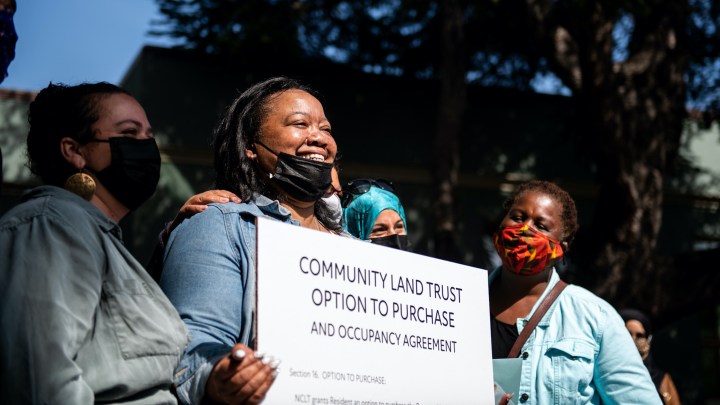
Grandmother’s foreclosed home tests new California law

For the better part of the last 20 years, Jocelyn Foreman and her five children were homeless and couch-surfing with relatives. It wasn’t until she moved two years ago into the single-story tan house in Pinole, a suburb outside of San Francisco, that she finally had stability.
“I thought I was breaking the cycle,” said Foreman, a grandmother of three.
That is, until she found a notice on the door: Her landlord had lost the home to foreclosure and it was set for sale at an auction.
“Like, the first thing that I thought was, ‘Where am I going to sleep? Whose house can I call?’” she said.
Path to homeownership
Foreman had hoped she would be able to buy the house and continue living there, thanks to a new California law, Senate Bill 1079, signed by Gov. Gavin Newsom last fall. The new law is designed to prevent pandemic profiteering — and give tenants like Foreman a path to homeownership by opening a 45-day window to find the money to match a winning bid when foreclosed properties go to auction.
So in March, Foreman went to the foreclosure auction for the house she lives in.
The winning bid was $600,000; Foreman said it was much more than she could possibly match.
“I said, ‘Oh, my goodness.’ You know, a little bit of me felt like this was going to happen,” she said.
The winning bid had been made by Wedgewood Inc., a Southern California-based real estate company that specializes in flipping homes in distressed neighborhoods.
“If we make money, we make money on our efficiency, on what we do,” said Wedgewood founder and CEO Greg Geiser. “We typically make money on a rehab because we can do it better, quicker, faster and cheaper than somebody else.”
Corporate homeownership
The company drew national scrutiny in late 2019 when a group of Black homeless mothers occupied a vacant house that Wedgewood had purchased at a foreclosure auction. The group, who called themselves Moms 4 Housing, staged a two-month-long protest there to shine a light on increasing corporate homeownership, which they said has led to rising rents and growing homelessness.
That controversy also sparked debate in the Legislature that resulted in the new state law, SB 1079, that went into effect this year.
Kevin Stein, the deputy director of the California Reinvestment Coalition said the new law “was an effort to open the door to create an opportunity for families, for tenants to attain wealth through homeownership.”
But the law didn’t include any money to help people like Foreman buy those foreclosed houses. And it hasn’t stopped companies like Wedgewood from buying up homes.
Since the law went into effect, property records show Wedgewood alone has bought more than 100 homes across California. Almost all of them were paid in cash and most were single-family homes, just like Foreman’s house in Pinole.
Help from land trust
Eventually Foreman was able to secure enough funding to buy the house. She celebrated at a recent public signing of her contract with the Northern California Land Trust, the nonprofit that bought the property. The land trust helped her raise the money along with the assistance of an online fundraising campaign.
Foreman will work out a financing deal to ensure that she can afford the monthly payments on the house.
“This house was so important to me. It was my opportunity to break cycles for myself and for my children,” Foreman said. “I am beyond words right now.”
But advocates say for the new law to be truly effective, the state will need to fund it so that more families like Foreman’s can compete with real estate entities, one house at a time.
There’s a lot happening in the world. Through it all, Marketplace is here for you.
You rely on Marketplace to break down the world’s events and tell you how it affects you in a fact-based, approachable way. We rely on your financial support to keep making that possible.
Your donation today powers the independent journalism that you rely on. For just $5/month, you can help sustain Marketplace so we can keep reporting on the things that matter to you.

















